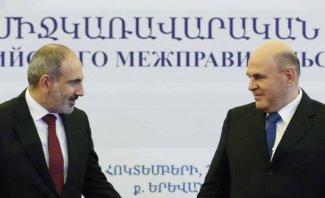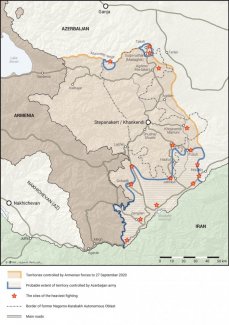Russia on the Nagorno-Karabakh conflict: calculated neutrality

In his speech at the annual meeting of the Valdai discussion club on 22 October, Russian President Vladimir Putin outlined Russia’s position on the conflict in Nagorno-Karabakh. He stressed that Russia has ‘special’ relations not only with Armenia but also with Azerbaijan, and that both countries are equal partners for Russia. Putin pointed out that ethnic issues were at the root of the conflict, and stated that crimes had been committed against the Armenian people in the disputed area. On the other hand, referring to Azerbaijan, he said that a situation in which a state does not control part of its territory cannot last forever. Speaking of the OSCE’s Minsk Group, which is the main international negotiating format for resolving the conflict, he said that in view of its ineffectiveness, it should be slightly modified. Putin spoke positively about Russia’s relationship with Turkey, which is supporting Azerbaijan in this conflict, calling Turkey’s President Recep Tayyip Erdoğan a decisive and flexible partner. According to Putin, it is pleasant and safe to cooperate with such a partner. Meanwhile, on 23 October Russia’s deputy foreign minister Aleksandr Pankin confirmed that as long as the fighting continues outside the territory of Armenia proper, there was no reason to talk about activating the guarantees (concerning aid, including military assistance) of the Collective Security Treaty Organisation (CSTO) for Armenia.
Despite Russia’s intensive diplomatic efforts to bring about a ceasefire since the beginning of the new phase of the conflict, these have not succeeded in halting the fighting. The tactical ceasefire agreements agreed on 10 and 17 October have proved ineffective. The visits by the heads of diplomacy of Armenia and Azerbaijan to Moscow on 20 and 21 October did not yield any results. On 14 October, the head of Russia’s diplomacy announced that a Russian peacekeeping mission in the form of military observers could be sent into the conflict zone, provided that the belligerents accepted such a step. The proposal was supported by the Armenian government, but it appears not to have been agreed to by Azerbaijan, which has been expanding the areas under its control in recent days. At the same time, there are unconfirmed media reports that Russian soldiers have been seen on the borders of Armenia and the territories previously controlled by Armenians in Karabakh. Sources in Azerbaijan have also accused Moscow of supporting Yerevan with arms supplies.
Commentary
- Regarding the latest phase of the clashes in Nagorno-Karabakh, the Russian authorities are continuing to focus on diplomatic activities as they attempt to maintain a neutral attitude towards the parties to the conflict. The aim is to avoid direct Russian involvement in the war and maintain the status of mediator, which in the past has given the Kremlin room to exploit the long-smouldering conflict in the Southern Caucasus for its own political ends. If Moscow came down on one side or the other, this would undermine the balance in relations which it has tried to cultivate. Armenia is a culturally close country for Russia, its military ally within the CSTO, and it hosts a significant Russian presence (including military forces). In principle, Yerevan has counted on the Kremlin’s support from the beginning of the fighting. These expectations have risen in tandem with the losses of the territories it controls in the Karabakh region as a consequence of the effective offensive by Azerbaijan. However, the Kremlin does not want to take any actions which could antagonise Azerbaijan. This country, although its political toes to Russia are somewhat looser than those with Armenia, cooperates economically with Moscow, including as an arms customer. Also – which is important for the Kremlin – it is an authoritarian state and, unlike Armenia, it has no aspirations to forge closer ties with the West (especially the EU).
- The problem for Moscow is that the peace initiatives it inspired – particularly the truce on 10 October, which Russian diplomacy presented as a success – were not respected and did not lead to a durable ceasefire. This has undermined Russia’s prestige as a mediator and arbiter in the region, and has forced it to put forward new proposals which will require greater involvement and risks, such as the possible introduction of a Russian peacekeeping mission into the area. Putin’s assertion that a situation where a state does not control part of its territory cannot last forever suggests that Russia has come to terms with a breach of the status quo. It is ready to use legalism as a shield (from the point of view of international law, Nagorno-Karabakh and the Armenian-occupied adjacent areas are indeed parts of Azerbaijan) in order to accept Azerbaijan taking de facto control over some part of the disputed territories from the Armenians and forcing Yerevan into a peace settlement, on conditions which will largely depend on Baku’s determination. Ignoring Yerevan’s interests may be a way for Russia to weaken or even depose Armenia’s Prime Minister Nikol Pashinyan, whose pro-Western rhetoric and political decisions (such as the personnel changes in Armenia’s security apparatus) have disturbed Moscow. Moreover, Pashinyan came to power as a result of a peaceful revolution, which did not suit the Kremlin’s taste as it remains hostile to any bottom-up changes of government in its neighbourhood. However, Russia’s lack of support for Armenia in this difficult situation undermines its position as a trusted and reliable partner for the post-Soviet states which Moscow would like to keep under its control, while minimising the costs incurred.
- Putin’s conciliatory statements during the Valdai Club meeting on Russia’s relations with Turkey and President Erdoğan, at a moment when Ankara is acting as Azerbaijan’s protector and openly expressing the possibility of military interference in the conflict, indicate that Russia is trying to avoid a deterioration of its relations with Turkey. On the one hand, this position is justified by the Kremlin’s hope that it will be able to exploit the growing conflicts between Turkey and the West (the US and the EU, especially Greece and France), which are weakening NATO’s cohesion. On the other hand, confrontation with Turkey in yet another area could have unforeseen political consequences and risks, which Russia – currently preoccupied with its own internal problems and tensions in relations with the West – would prefer not to take at this stage. Moscow and Ankara’s conflicting interests are already clashing in Syria and Libya. Russia would probably also be prevented from directly entering into another conflict involving Turkey by the fact that in its opinion this would be a game initiated by Ankara, and not one of its own invention. If Moscow allowed modifications to the OSCE Minsk Group – presumably by including Turkey in its co-presidency (or creating a different format for the talks in which Turkey could participate) – that would represent an implementation of Azerbaijan’s demands, and a significant concession by Russia to Ankara. This would mean a symbolic recognition of Turkey’s aspirations and its right to play a greater role in the Southern Caucasus, which Moscow considers to be its sphere of influence.
Map. Armenia and Azerbaijan. The area of the Nagorno-Karabakh conflict (as of 26 October 2020)

Source: author’s own research, based on the Censor.net website and press reports.





